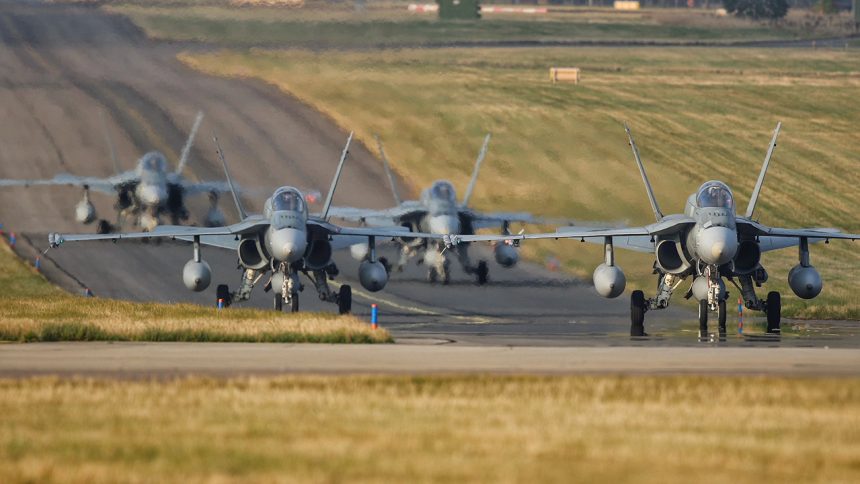Cobra Warrior 24-2 is a large multinational exercise taking place in the UK between Sept. 16 and Oct. 4 2024, directed by the Air and Space Warfare Centre at RAF Waddington. Check out these great photos of some of the aircraft involved.
Since Sept. 16, 2024, around 80 aircraft from nations across NATO have been putting their skills to the test in what’s now become one of the alliance’s most well known exercises. Usually held twice a year, once in the Spring and once in the Autumn, this year’s Spring edition (Cobra Warrior 24-1) was cancelled for unknown reasons, leaving the Autumn event as the only Cobra Warrior exercise for 2024.
Alongside locally based units from the Royal Air Force and United States Air Force, visiting aircraft have included USAF F-16s from the 31st FW at Aviano Air Base, Italy, Polish F-16s from 3 Squadron, Norwegian F-35As from 332 Squadron, Canadian F/A-18s from 409 Squadron, and Finnish F/A-18s from Fighter Squadron 11.
The exercise focuses on interoperability between different air arms and their respective aircraft in a contested air environment on a level that would be expected in a conflict with a peer or near peer adversary. The previous year’s exercise was structured around a fictional nation fighting to liberate territory that has been occupied by a hostile foreign power. This year likely had a similar set up, with some changes to ensure it remains able to put crews on their toes and test their reactions to unexpected and unfamiliar situations. Using fictional countries, and even organisations, as part of exercises is commonplace, at least among NATO forces – while the types of belligerents being represented might be clear from the surrounding context, avoiding using direct names can avoid diplomatic incidents resulting from the scenarios that are played out.
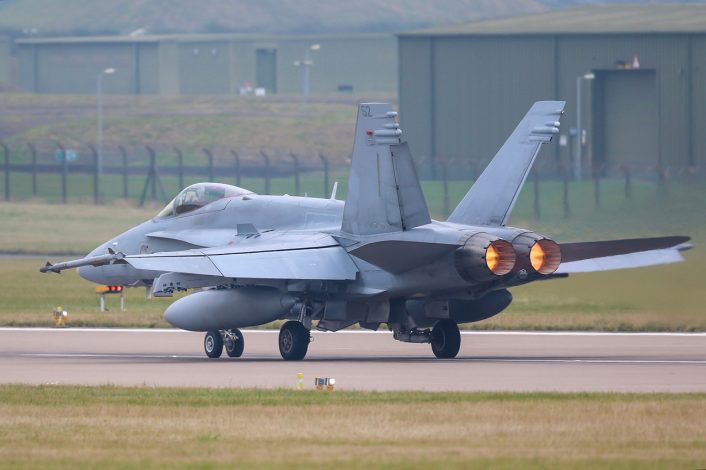
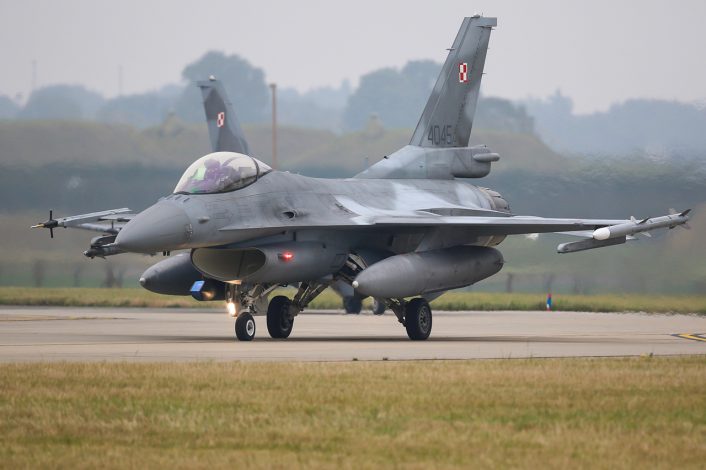
Both the Polish and Finnish contingents are scheduled to take part in the upcoming Exercise Steadfast Noon, again operating from RAF Waddington, which begins on Oct. 14. The aircraft are expected to remain at the base between the two exercises.
The large training areas over the North Sea have been a home to large NATO exercises for many decades. RAF Waddington was previously the control hub for a massive Air Combat Maneuvring Instrumentation (ACMI) range located here, which saw the base host an extraordinary range of visiting fast jets between its opening in 1990 and its closure in the mid 2000s. The formerly annual Exercise Nomad made heavy use of this range. Modern technology that has seen ACMI technology integrated into pods that can be fitted on an aircraft’s weapon rails made fixed ranges like this redundant, but the large airspace and its military training areas (including the well known D323 Complex or ‘the 323s’) are still heavily used.
Norway’s eight participating F-35As joined the large U.S. Air Force F-35A fleet at RAF Lakenheath for the exercise. Both USAF F-35A squadrons at Lakenheath are also participants in Cobra Warrior 24-2. They departed RAF Lakenheath on Sept. 27 for their home base of Ørland as they are not due to take part in the night flying segment of the exercise which makes up its third and final week.
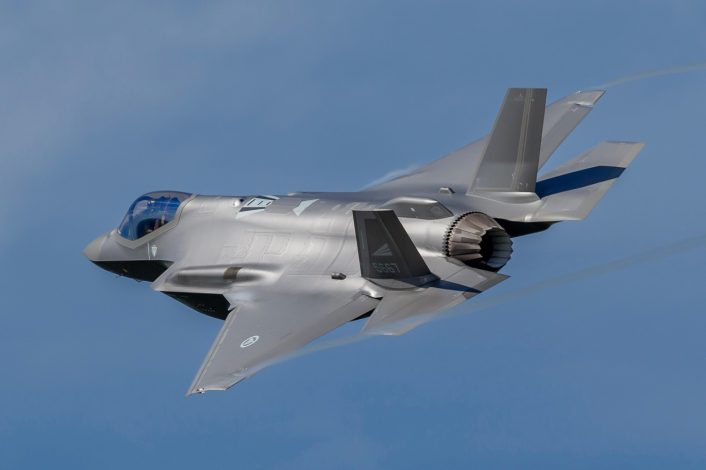
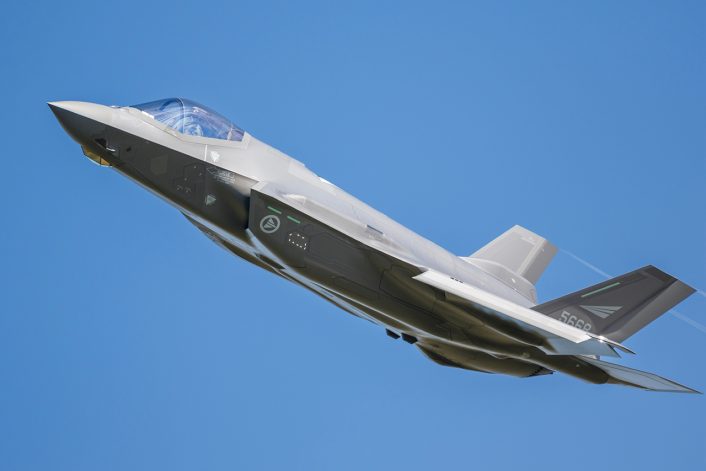
The eight USAF F-16s joining the exercise from 555th Fighter Squadron, 31st Fighter Wing, based at Aviano AB in Northern Italy, made their home at RAF Mildenhall alongside the based KC-135 Stratotankers of the 100th Air Refueling Wing who are providing tanker support during Cobra Warrior.
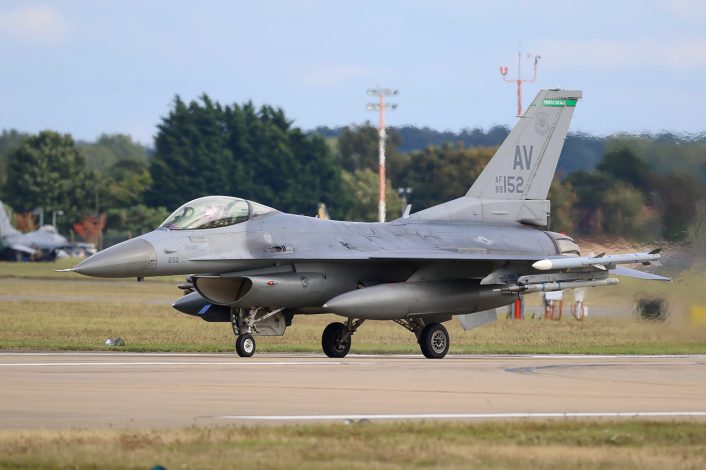
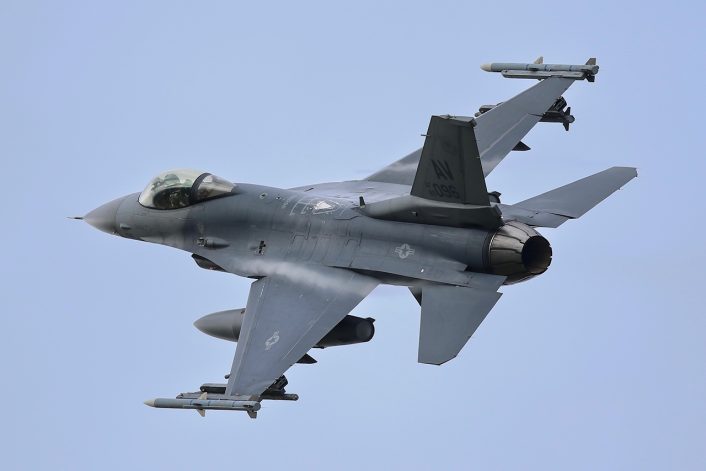
A Revealing Photo
The Royal Canadian Air Force deployed eight F/A-18 Hornets (Canadian designation CF-188 Hornet) to RAF Waddington for Cobra Warrior, and a picture taken showing a small marking on one of these Hornets has seemingly revealed something previously unknown about the airframe.
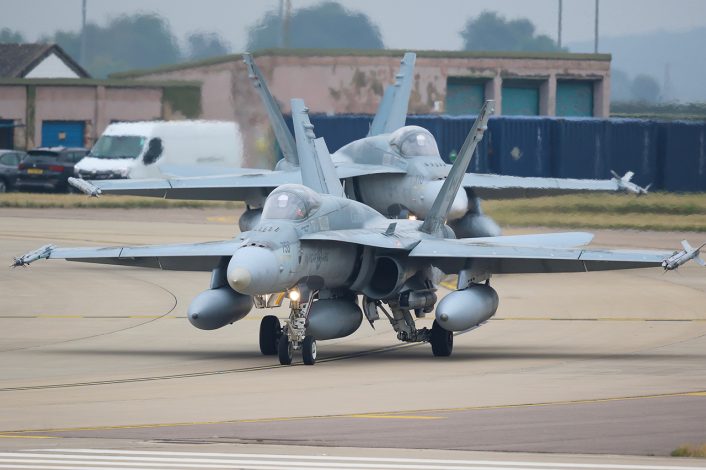
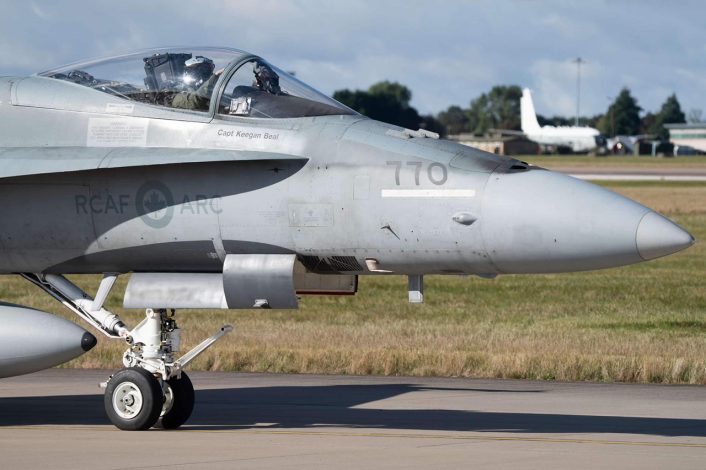
The tiny marking shows an F/A-18 silhouette with the starboard side main landing gear missing. This type of marking has apparently been used previously as a tongue in cheek marker that the airframe had survived a landing gear collapse incident. However, records for 188770 do not show any such incident, nor is it seemingly recorded in any public RCAF incident logs. Any further detail on when or where this happened is unknown, aside from that it likely happened after 2017 but before 2022, based on previous images where it can be seen.
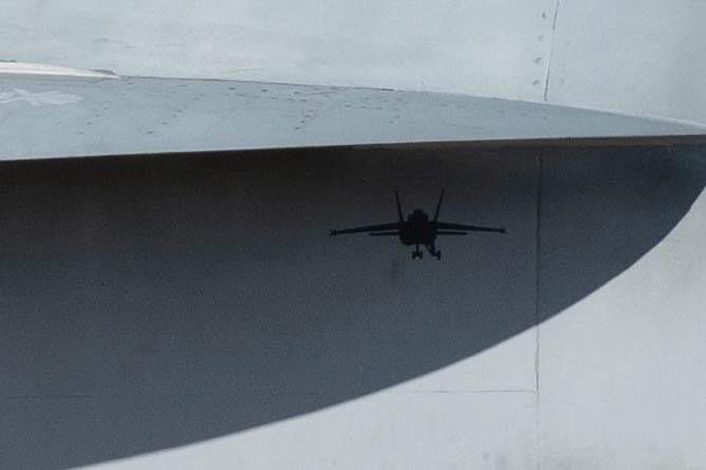
A more recent incident for the RCAF took place upon their arrival to the UK ahead of Cobra Warrior when CC-130H Hercules 130339 suffered a bird strike while landing at RAF Waddington, which appeared to have left a sizable hole in the leading edge of the wing. Thankfully, this damage appears to have either been repaired, or was more superficial than it appeared, as the aircraft has continued with its participation in the exercise as a refuelling tanker.
The Canadian contingent were supported by the RCAF’s CC-177 (C-17) fleet, with 177705 being the first arrival of the exercise to Waddington back on Aug. 29. Poland and Finland each sent CASA C-295Ms, and the latter additionally sent a Learjet. Norway sent a C-130 to Lakenheath to support their F-35s, and the USAF F-16s from Aviano deployed to Mildenhall were also supported by a C-130.
Red Air
The aggressor aircraft operated by Draken Europe are an almost daily sight over the North Sea ranges, and Cobra Warrior 24-2 ha been no exception. Operating from Teesside International Airport with specially modified Dassault Falcon 20 and L-159 Honey Badger aircraft, the company is one of the main providers of threat simulation to the British military as allied forces. They were formerly known as Cobham, who first made their name as pioneers of air-to-air refuelling under the name Flight Refuelling Limited, but were acquired by the American red air giant Draken in 2020.
Although at heart an almost sixty year old business jet design, Draken’s Falcon 20s are highly capable aggressor platforms. Four hardpoints on their wings can be used for carrying a variety of mission pods, with functions including radio frequency jamming, threat simulation, ACMI and target towing. The Falcon 20 fleet is split between Teesside and Bournemouth Airport. From Bournemouth they regularly work with the Royal Navy and their FOST program.
It is possible that some of the locally based forces were also assigned to play in the hostile red air role, similar to the setup used by the famous Red Flag exercises from Nellis AFB, Nevada. Royal Air Force aircraft involved in Cobra Warrior 24-2 included both of the air arm’s frontline fast jet types – the Typhoon and the F-35B Lightning II. British types additionally listed by the CAA as taking part are Voyager, A400M, C-17, Chinook, Wildcat and Apache. Merlin is also among the types listed, but the UK’s Merlin fleet is currently grounded following the Sept. 5 incident.
Many thanks to Stewart Jack and Matt Hallam for providing the images used in this article. Additional thanks to X user @northdud for her assistance in researching the curious RCAF Hornet marking.

